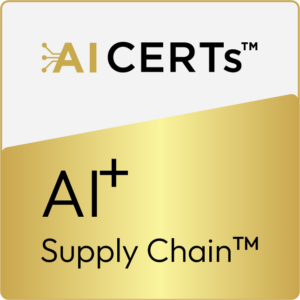- modules: 8
- Examination: 1
- Examination Time: 50 MCQs, 90 Minutes
- Passing Score: 70%
About Certification
AI+ Supply Chain course provides a thorough examination of how Artificial Intelligence (AI) is changing supply chain management, covering basic concepts up to advanced uses. It includes key subjects like AI methods for improving supply chains, the impact of generative AI on developing strategies, and the digitalization of supply chain operations. The course also delves into decision-making guided by AI, applications specific to various industries, and the incorporation of AI into managing logistics. The last module offers a practical workshop where participants can utilize AI concepts for actual supply chain problems, getting them ready to spearhead AI-based advancements in their companies.
Prerequisites
- Foundational knowledge of supply chain concepts, processes, and operations.
- A general understanding of Artificial Intelligence, including machine learning and data analytics, is recommended.
- Prior experience with business management or technical tools, such as ERP systems or data analysis software, will be beneficial.
- Strong analytical and problem-solving skills are essential to understand and apply AI-driven techniques in supply chain scenarios.
Certification Modules
- 1.1 Overview of Artificial Intelligence in Supply Chain Management (SCM)
- 1.2 Transforming Supply Chains with AI
- 1.3 Ethical Implications of AI in Supply Chains
- 2.1 Machine Learning in Supply Chain
- 2.2 Expert Systems in SCM
- 2.3 Integrating Images and Text in Supply Chain AI
- 3.1 The Origin of Generative AI
- 3.2 Generative AI in Revenue Management and Demand Forecasting
- 3.3 Transformer and LSTM Architectures in Generative AI
- 4.1 Introduction to Supply Chain Digitization
- 4.2 Supply Chain Integration and Push-Pull Strategies
- 4.3 Supply Chain Resiliency, Planning and Sustainability
- 5.1 Introduction to Smart SCM
- 5.2 Employing Smart SCM and Prompt Engineering
- 5.3 Future Trends of Smart SCM
- 6.1 Introduction to Industrial SCM
- 6.2 Business Value from AI and Gen AI in Supply Chain
- 6.3 Risks and Challenges of Adopting AI and Gen AI in Industrial SCM
- 7.1 Role of Supply Chain Management in the Organization
- 7.2 Warehousing Strategy for Efficient Supply Chain Management
- 7.3 Technical Coverage of SCM with Multi-Dimensional Aspects
- 8.1 Supplier Selection and Relationship Management with AI
- 8.2 Mastering Advancements in SCM with Modern Artefacts
Certification outcome
After finishing the AI + Supply Chain course, students will receive a certification showing their skill in efficiently incorporating advanced AI methods in supply chain management. They will have the abilities to improve supply chain operations, utilize AI for making decisions based on data, and introduce AI-driven advancements in different industry environments. This certification enables professionals to lead digital transformation, improve operational efficiency, and strategically address supply chain challenges with advanced AI technologies.











